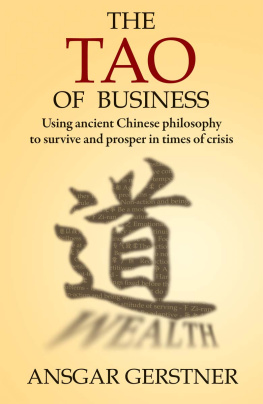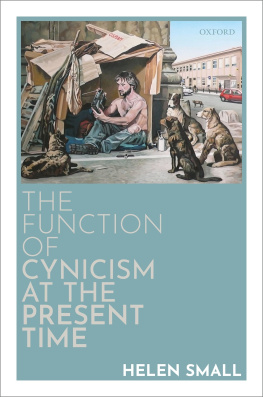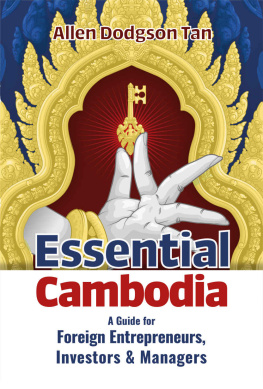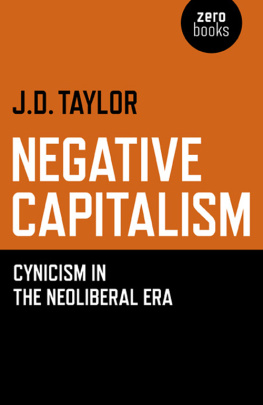Ansgar Allen - Cynicism (The MIT Press Essential Knowledge)
Here you can read online Ansgar Allen - Cynicism (The MIT Press Essential Knowledge) full text of the book (entire story) in english for free. Download pdf and epub, get meaning, cover and reviews about this ebook. year: 2020, publisher: MIT Press, genre: Religion. Description of the work, (preface) as well as reviews are available. Best literature library LitArk.com created for fans of good reading and offers a wide selection of genres:
Romance novel
Science fiction
Adventure
Detective
Science
History
Home and family
Prose
Art
Politics
Computer
Non-fiction
Religion
Business
Children
Humor
Choose a favorite category and find really read worthwhile books. Enjoy immersion in the world of imagination, feel the emotions of the characters or learn something new for yourself, make an fascinating discovery.

- Book:Cynicism (The MIT Press Essential Knowledge)
- Author:
- Publisher:MIT Press
- Genre:
- Year:2020
- Rating:3 / 5
- Favourites:Add to favourites
- Your mark:
- 60
- 1
- 2
- 3
- 4
- 5
Cynicism (The MIT Press Essential Knowledge): summary, description and annotation
We offer to read an annotation, description, summary or preface (depends on what the author of the book "Cynicism (The MIT Press Essential Knowledge)" wrote himself). If you haven't found the necessary information about the book — write in the comments, we will try to find it.
Cynicism (The MIT Press Essential Knowledge) — read online for free the complete book (whole text) full work
Below is the text of the book, divided by pages. System saving the place of the last page read, allows you to conveniently read the book "Cynicism (The MIT Press Essential Knowledge)" online for free, without having to search again every time where you left off. Put a bookmark, and you can go to the page where you finished reading at any time.
Font size:
Interval:
Bookmark:
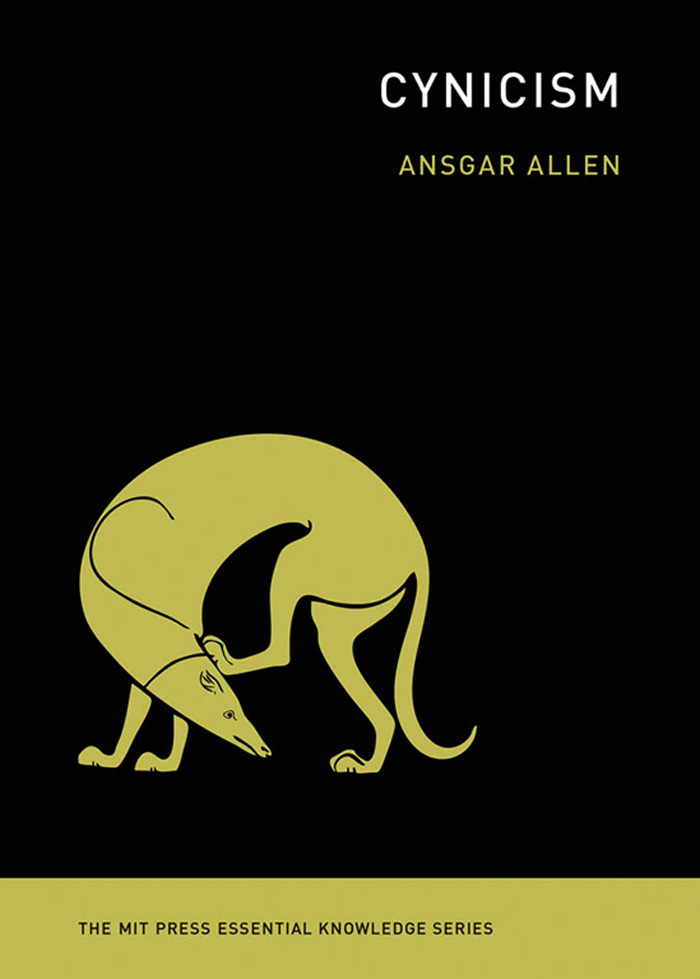
The MIT Press Essential Knowledge Series
A complete list of the titles in this series appears at the back of this book.
Ansgar Allen
The MIT Press | Cambridge, Massachusetts | London, England
2020 Massachusetts Institute of Technology
All rights reserved. No part of this book may be reproduced in any form by any electronic or mechanical means (including photocopying, recording, or information storage and retrieval) without permission in writing from the publisher.
This book was set in Chaparral Pro by Toppan Best-set Premedia Limited.
Library of Congress Cataloging-in-Publication Data
Names: Allen, Ansgar, author.
Title: Cynicism / Ansgar Allen.
Description: Cambridge, MA : MIT Press, 2020. | Series: The MIT Press
essential knowledge series | Includes bibliographical references and index.
Identifiers: LCCN 2019006326 | ISBN 9780262537889 (pbk. : alk. paper)
Subjects: LCSH: Cynicism.
Classification: LCC B809.5 .A45 2019 | DDC 183/.4dc23 LC record available at https://lccn.loc.gov/2019006326
10 9 8 7 6 5 4 3 2 1
d_r0
The MIT Press Essential Knowledge series offers accessible, concise, beautifully produced pocket-size books on topics of current interest. Written by leading thinkers, the books in this series deliver expert overviews of subjects that range from the cultural and the historical to the scientific and the technical.
In todays era of instant information gratification, we have ready access to opinions, rationalizations, and superficial descriptions. Much harder to come by is the foundational knowledge that informs a principled understanding of the world. Essential Knowledge books fill that need. Synthesizing specialized subject matter for nonspecialists and engaging critical topics through fundamentals, each of these compact volumes offers readers a point of access to complex ideas.
Bruce Tidor
Professor of Biological Engineering and Computer Science
Massachusetts Institute of Technology
A cynic has a low view of humankind. To be cynical is to regard others with distrust. Contemptuous, if not mocking, of noncynical natures, the cynic views human sincerity and integrity with scorn, believing them to be a cover for self-interest. As a cultural disposition, cynicism foments distrust, derails progress, and reduces all higher things, all that is good about humankind, to the level of its own diminished outlook. It assumes that all human motives are basically selfish and denies the possibility of a better world.
There was once a very different form of cynicismCynicism with a capital C. Its most famous practitioner was the Cynic Diogenes, born around 412403 BCE. Diogenes was known for his low opinion of his ancient Greek contemporaries, but was committed to changing the conditions by which they lived. In this respect, his Cynicism was the opposite of our own jaded condition where mass cynicism encourages us to believe that any attempts to change the world are doomed to fail before they even begin. This book will compare ancient and modern forms of cynicism in order to better understand the latter. It will explore how each cynicism is the product of and holds a mirror to the society in which it appears. As it compares the two, it will also investigate how one turned into the other, offering a journey through the various intermediate forms that cynicism has taken over the last two and a half thousand years.
At first glance, the differences are indeed stark. As a loosely connected group of mendicant philosophers, the ancient Cynics were easy to identify by their characteristic dressthe famous staff and cloaktheir deliberate self-impoverishment, unrefined manners, lack of shame, perplexing behavior, and barking tone. These Cynics criticized the culture in which they found themselves by adopting a way of life designed to scandalize contemporaries, draw out their prejudices, and bear witness to the possibility of a completely different attitude to existence. By contrast, modern cynics are much harder to identify. No longer a philosophy practiced by a tiny minority of converts, cynicism has gone mainstream. We are all cynics now. The modern cynical attitude still casts a suspicious gaze on cultured refinements and rarefied customs, yet its scandalizing impulse functions at a lower key. Operating without
Both ancient and modern C/cynicisms can be understood as devianteach entails some kind of departure from accepted principles of public and individual conduct. These principles provide the framework within which C/cynic deviance is understood and furnish the rationale by which it is rejected or denounced. C/cynicism is always expressed in relation to some standard or other by which it is judged, and against which its hostility is measured. Both ancient and modern C/cynics cannot abide higher standardsthe former more fervently than the latterwhere all turgid talk, all pomposity is undercut, or pierced, so that (in Cynic terms) the inflated gut of the idealist can let out a little gas. C/cynics are not good people in any conventional sense. Or, in the modern case, and to be more precise, if one is a good person it is in spite of rather than because of ones cynicism. These commonalities between ancient and modern C/cynicisms should not be overdrawn, however. Though deviance provides a common theme, it is still construed differently in each context. Whereas ancient Cynicism was willfully abnormalif it was sick, it was deliberately sothe waywardness of modern cynicism is largely unwilled if not automated.
As an attitude, modern cynicism is deviant in the pathological sense of the word: it afflicts us. This cynicism ranges from the opportunistic and manipulative cynicism of the powerfulwho will do anything to secure greater influence and wealthright through to the abject cynicism of the oppressed and marginalized. The two are bound together, with the cynicism of the powerful giving endless cause to be cynical for those lacking influence, and with the cynicism of the latter leading to a state of indifference or paralysis before the crimes of the former. In these settings there may be good reason to be cynical, but this cynicism will get us nowhere, or so the argument goes. Only hope and concerted political action motivated by a commitment to higher or collective ideals will change things for the better. But still our cynicism returns. It is experienced as a condition we are reduced to in moments of frustration or despair. We excuse our cynicism today as if it were an involuntary outburst, something issuing from a darker part of ourselves that the greater self must resist succumbing to entirely: I hate to be cynical, but
We excuse our cynicism today as if it were an involuntary outburst, something issuing from a darker part of ourselves that the greater self must resist succumbing to entirely: I hate to be cynical, but
Given all of the above, it is expected that we all have our cynical moments. Widespread, almost inevitable if not endemic, the tendency to cynicism in present-day society is understood by some to be as much a feature of political crisisthe rise of post-truth and the alt-right, the weakening of liberal democracy and progressive politics in the face of populism, the failure of international organizations to respond adequately to global challenges such as climate changeas it is a political or personal choice. One might understand modern cynicism as just one indicator of a broader cultural malaise. It manifests as contemporary polities veer between violent extremism and collective apathy. This cynicism is both a sign and a symptom, perhaps even a cause of dark times. In such contexts, individuals are rarely directly imperiled by their cynical attitudes; rather, the pervasive nature of their cynicism places us all in danger.
Next pageFont size:
Interval:
Bookmark:
Similar books «Cynicism (The MIT Press Essential Knowledge)»
Look at similar books to Cynicism (The MIT Press Essential Knowledge). We have selected literature similar in name and meaning in the hope of providing readers with more options to find new, interesting, not yet read works.
Discussion, reviews of the book Cynicism (The MIT Press Essential Knowledge) and just readers' own opinions. Leave your comments, write what you think about the work, its meaning or the main characters. Specify what exactly you liked and what you didn't like, and why you think so.


